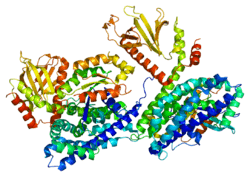ARHGEF9
Rho guanine nucleotide exchange factor 9 is a protein that in humans is encoded by the ARHGEF9 gene.[1][2][3]
Function
ARHGEF9 belongs to a family of Rho-like GTPases that act as molecular switches by cycling from the active GTP-bound state to the inactive GDP-bound state. These proteins are key regulators of the actin cytoskeleton and are involved in cell signaling.[supplied by OMIM][3]
Interactions
ARHGEF9 has been shown to interact with GPHN[4] and SMURF1.[5]
References
- ↑ Reid T, Bathoorn A, Ahmadian MR, Collard JG (Dec 1999). "Identification and characterization of hPEM-2, a guanine nucleotide exchange factor specific for Cdc42". J Biol Chem 274 (47): 33587–93. doi:10.1074/jbc.274.47.33587. PMID 10559246.
- ↑ Ishikawa K, Nagase T, Nakajima D, Seki N, Ohira M, Miyajima N et al. (Feb 1998). "Prediction of the coding sequences of unidentified human genes. VIII. 78 new cDNA clones from brain which code for large proteins in vitro". DNA Res 4 (5): 307–13. doi:10.1093/dnares/4.5.307. PMID 9455477.
- ↑ 3.0 3.1 "Entrez Gene: ARHGEF9 Cdc42 guanine nucleotide exchange factor (GEF) 9".
- ↑ Kins S, Betz H, Kirsch J (2000). "Collybistin, a newly identified brain-specific GEF, induces submembrane clustering of gephyrin". Nat. Neurosci. 3 (1): 22–9. doi:10.1038/71096. PMID 10607391.
- ↑ Yamaguchi K, Ohara O, Ando A, Nagase T (Apr 2008). "Smurf1 directly targets hPEM-2, a GEF for Cdc42, via a novel combination of protein interaction modules in the ubiquitin-proteasome pathway". Biol. Chem. 389 (4): 405–13. doi:10.1515/BC.2008.036. PMID 18208356.
Further reading
- Suzuki Y, Yamashita R, Shirota M, Sakakibara Y, Chiba J, Mizushima-Sugano J et al. (2004). "Sequence Comparison of Human and Mouse Genes Reveals a Homologous Block Structure in the Promoter Regions". Genome Res. 14 (9): 1711–8. doi:10.1101/gr.2435604. PMC 515316. PMID 15342556.
- Harvey K, Duguid IC, Alldred MJ, Beatty SE, Ward H, Keep NH et al. (2004). "The GDP-GTP exchange factor collybistin: an essential determinant of neuronal gephyrin clustering". J. Neurosci. 24 (25): 5816–26. doi:10.1523/JNEUROSCI.1184-04.2004. PMID 15215304.
- Grosskreutz Y, Hermann A, Kins S, Fuhrmann JC, Betz H, Kneussel M (2002). "Identification of a gephyrin-binding motif in the GDP/GTP exchange factor collybistin". Biol. Chem. 382 (10): 1455–62. doi:10.1515/BC.2001.179. PMID 11727829.
- Kins S, Betz H, Kirsch J (2000). "Collybistin, a newly identified brain-specific GEF, induces submembrane clustering of gephyrin". Nat. Neurosci. 3 (1): 22–9. doi:10.1038/71096. PMID 10607391.
| |||||||||



